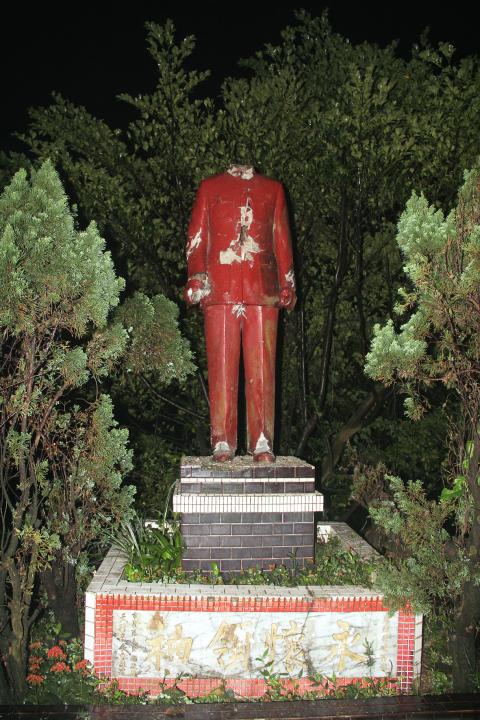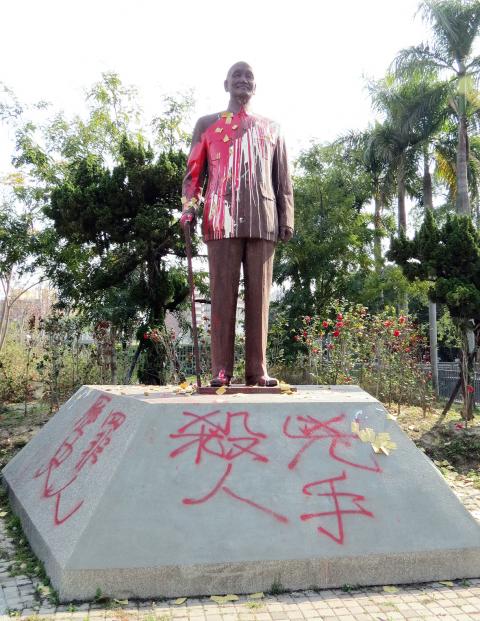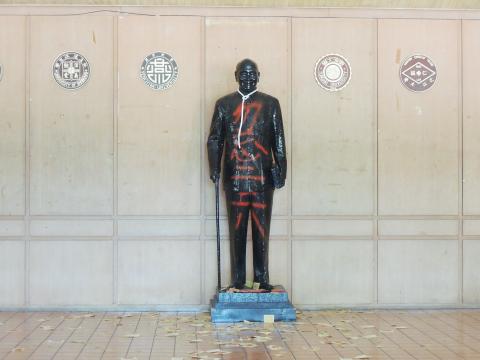An unusually high number of protests targeting statues of former president Chiang Kai-shek (蔣介石) have been reported across the nation in the wake of the 68th anniversary of the 228 Incident on Saturday.
A statue of Chiang erected in Taichung City’s Jhongjheng Park (中正公園) was found yesterday morning covered with white and red paint as well as ghost money, with the Chinese characters for “killer” and “villain” spray-painted on its pedestal.
Police said it was the second defacement of the stone statue in two days. On Saturday morning, it was discovered with the Chinese character for “murderer” spray-painted on its base. City workers removed the graffiti later that day.

Photo: Wu Cheng-feng, Taipei Times
Taichung’s Construction Bureau director Huang Yu-lin (黃玉霖) said the agency has teamed up with the city’s Education Bureau in investigating if other statues of Chiang have been vandalized.
The city government said that just four of the city’s approximately 400 parks have statues of Chiang and that it would consider whether to keep or relocate them once the investigation has been concluded.
It said no charges would be filed against whoever is responsible, as the spray-painted slogans are considered to be equivalent to stains, but that police presence in the areas involved would be increased.

Photo: Chang Ching-ya, Taipei Times
Meanwhile, in northern Taiwan, a beheaded statue of Chiang depicted in two photographs posted on a Facebook page titled “Indefinite Support to Art Installations Featuring Chiang” (無限期支持—全台裝置藝術蔣) on Saturday has been confirmed to be located in a park in Keelung.
Investigators said the fiberglass-based statue’s head was smashed to pieces, and the statue’s torso and ankles were damaged. They added that the perpetrators apparently attempted to knock the sculpture down before realizing that its legs are made of steel and concrete.
Statues of Chiang erected within Taoyuan’s Jhongjheng Park and in front of the Taoyuan Railway Station were also vandalized.

Photo: Tsai Shu-yuan, Taipei Times
In addition, sculptures of Chiang on campuses nationwide have been defaced over the past few days, including ones at Taipei First Girls’ High School, Taipei Municipal Daan Vocational High School, National Chutung Senior High School, Tunghai University and National Taipei University of Technology.
Tunghai University chief secretary Lu Ping-kuan (呂炳寬) said the school’s statue of Chiang and the Chiang Kai-shek Memorial Hall have existed for nearly three decades and carry historical significance to the university.
“While the school respects students’ opinions and is open to discussions regarding the hall’s renaming and the statue’s removal, they must be expressed in a rational manner,” Lu said, adding that vandalism would be dealt with in accordance with school regulations.

DAREDEVIL: Honnold said it had always been a dream of his to climb Taipei 101, while a Netflix producer said the skyscraper was ‘a real icon of this country’ US climber Alex Honnold yesterday took on Taiwan’s tallest building, becoming the first person to scale Taipei 101 without a rope, harness or safety net. Hundreds of spectators gathered at the base of the 101-story skyscraper to watch Honnold, 40, embark on his daredevil feat, which was also broadcast live on Netflix. Dressed in a red T-shirt and yellow custom-made climbing shoes, Honnold swiftly moved up the southeast face of the glass and steel building. At one point, he stepped onto a platform midway up to wave down at fans and onlookers who were taking photos. People watching from inside

A Vietnamese migrant worker yesterday won NT$12 million (US$379,627) on a Lunar New Year scratch card in Kaohsiung as part of Taiwan Lottery Co’s (台灣彩券) “NT$12 Million Grand Fortune” (1200萬大吉利) game. The man was the first top-prize winner of the new game launched on Jan. 6 to mark the Lunar New Year. Three Vietnamese migrant workers visited a Taiwan Lottery shop on Xinyue Street in Kaohsiung’s Gangshan District (崗山), a store representative said. The player bought multiple tickets and, after winning nothing, held the final lottery ticket in one hand and rubbed the store’s statue of the Maitreya Buddha’s belly with the other,

‘NATO-PLUS’: ‘Our strategic partners in the Indo-Pacific are facing increasing aggression by the Chinese Communist Party,’ US Representative Rob Wittman said The US House of Representatives on Monday released its version of the Consolidated Appropriations Act, which includes US$1.15 billion to support security cooperation with Taiwan. The omnibus act, covering US$1.2 trillion of spending, allocates US$1 billion for the Taiwan Security Cooperation Initiative, as well as US$150 million for the replacement of defense articles and reimbursement of defense services provided to Taiwan. The fund allocations were based on the US National Defense Authorization Act for fiscal 2026 that was passed by the US Congress last month and authorized up to US$1 billion to the US Defense Security Cooperation Agency in support of the

HIGH-TECH DEAL: Chipmakers that expand in the US would be able to import up to 2.5 times their new capacity with no extra tariffs during an approved construction period Taiwan aims to build a “democratic” high-tech supply chain with the US and form a strategic artificial intelligence (AI) partnership under the new tariffs deal it sealed with Washington last week, Taipei’s top negotiator in the talks said yesterday. US President Donald Trump has pushed Taiwan, a major producer of semiconductors which runs a large trade surplus with the US, to invest more in the US, specifically in chips that power AI. Under the terms of the long-negotiated deal, chipmakers such as Taiwan Semiconductor Manufacturing Co (TSMC, 台積電) that expand US production would incur a lower tariff on semiconductors or related manufacturing